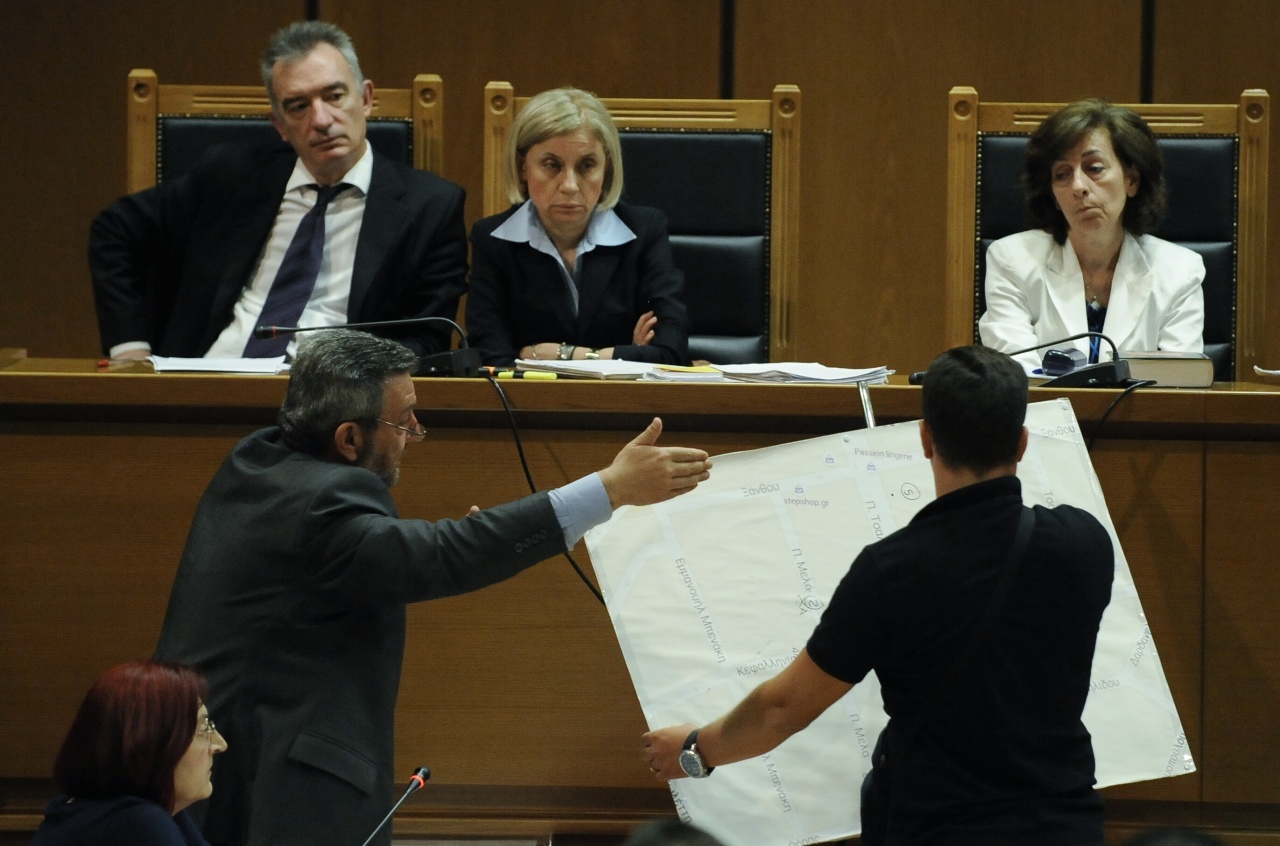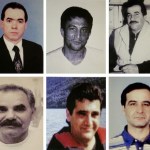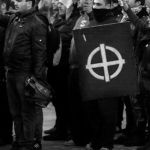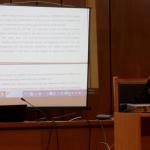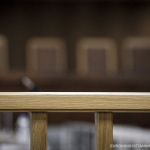75th Hearing, Ceremonial Hall, Athens Court of Appeals, Athens, 15 July 2016
1. Court access
The courtroom remains open to the public on presentation of a state ID card, which police retain for the session. Spectators and press were present.
2. Presence and representation of the defendants
Fourteen of the 18 defendants whose physical presence was mandated by the court were in attendance; 27 defendants were recorded as absent, while the others’ representation was discussed during the day’s proceedings.
3. Resumption of cross-examination of Ilias Kontonikolas by the defence
Ilias Kontonikolas, a friend of Pavlos Fyssas, returned to the stand for his second day of cross-examination by the defence.
In response to questions from defence lawyer Vasiliki Pantazi, the witness said the Golden Dawn party had a Nazi ideology and wanted a “clean” nation without migrants. He said he didn’t know anyone who had voted for Golden Dawn in the 2012 elections, had been a candidate or was aware of the activities of any of the party’s MPs. He said he knew the location of the Golden Dawn branch office in Nikea but that he had never seen people entering because he wasn’t interested in them; he said he couldn’t recall a Golden Dawn activity before Fyssas’ murder.
Responding to defence lawyer Yiannis Zografos, the witness said that a fascist was someone who used violence to impose his views and that this conjured up Nazism and Golden Dawn. He had first encountered the term “assault squad” online and didn’t know if other political parties or organisations had assault squads. He could sense Golden Dawn members even before the murder because of the incident in which they attacked migrants at street markets. The witness reiterated that he knew Fyssas’ song “Gama tous” (Fuck them) was antifascist in content but he didn’t recall its lyrics. When Zografos asked him to comment on the lyric “I’ve got the gun barrel trained on your [skull’s] temple”, the witness said this was an allegory and didn’t mean he was literally pointing a gun.
In cross-examination by defence lawyer Dimitris Papadelis, the witness said he could tell if people were a Nazi or a democrat when they used the Nazi salute and waved flags with swastikas, as in the published pictures from inside the home of MP Christos Pappas. He said there was a difference between Golden Dawn and other political parties or organisations giving out leaflets because the Golden Dawn members go together as a group, have motorcycles, and generate a sense of fear, as they had done in his case. Kontonikolas said he didn’t follow parliamentary proceedings but that he had heard Golden Dawn positions inciting violence and the abolition of democracy.
Responding to defence lawyer Giorgos Michalolias, the witness said that he was assaulted because of his appearance – beard and long hair – and that Golden Dawn members had looked askance at him in the past. He said he had left Koralli café with Giorgos Doulvaris and it would have been evident to an observer that they were together, yet no one moved against them. It was more than obvious that three men inside Koralli were Golden Dawn. While taking his preliminary statement, the police officers had gone over what he had said and corrected things. In general, he is frightened by motorcycles with helmeted passengers, people moving in groups and groups comprised of people of a similar physical appearance and dress. The witness also said that he was beaten by three men and Fyssas was beaten by four. Afterwards, the three behaved as if they were keeping watch on him.
Cross-examined by defence lawyer Alexandros Alexiadis, the witness said he read about Ioannis Lagos’ text message online, on a couple of websites, but didn’t remember which ones. He didn’t know if there had been clashes at the Golden Dawn offices in Marousi and that a cabinet minister’s son had been arrested in connection with the incident. The witness testified that he had never been assaulted before, that it was one of the worst things that had ever happened to him, and that his attackers’ behaviour was barbaric. He believed the Golden Dawners had got together to kill, as they had, and that others could also have been killed that night as the Golden Dawners were capable of inflicting great damage. He had no idea what questions Lagos had submitted to parliament or anything about his political activities or his views on migrants.
Replying to defence lawyer Takis Michalolias’ questions, the witness said he hadn’t read Golden Dawn’s charter or about its organisational structure, nor did he know if political parties had organisational structures or if Golden Dawn held political conferences. He said he had seen clashes before and what he had experienced was not a clash.
Defence lawyer Periklis Stavrianakis then cross-examined the witness, who said he did not know whether there was a Red Army flag in Pappas’ house but that the MP was older than 28 years in the picture with the Hitler collection. Kontonikolas said he didn’t follow football and had gone to Koralli for a beer, and that he didn’t know who was at the café first – the Golden Dawn members or Fyssas. He reiterated that there hadn’t been an altercation between Fyssas and Roupakias. When the lawyer pointed out that the Dias motorcycle unit police officers had said that there had been an argument, the witness said he had testified what he had seen. Kontonikolas also said that he didn’t know who had called the police to report the incident, but that the three at the café had no reason to do so. He also stated that he and his friends had not gone to Koralli to swell the number of Fyssas’ group but to join them for a beer.
Questioned by defence lawyer Dimitris Bonis, the witness said he didn’t know why during half-time they hadn’t discussed the annoying stares they had been receiving. He also said it was pure chance that they had decided to drive to Koralli and that what he had impressed him most about the three Golden Dawn members had been the army boots they wore over their pants.
4. Testimony of Chrysoula Roupakia
Chrysoula Roupakia, a sister of defendant Giorgos Roupakias, was then called to the witness stand.
During examination by the presiding judge, Roupakia said she was the self-employed owner of a fish shop since 1994 and lived in Koropi. She said she had a good relationship with her brother, but their contact had been more frequent before the incident. Concerning her brother’s connection to Golden Dawn, she said she knew he went to their offices, took part in distributions and was moved by Golden Dawn members’ concern for Greeks. Her brother wasn’t a member, but merely a Golden Dawn party voter; membership required a fee for which you received a special card. She wasn’t a member of Golden Dawn either but had voted for the party in the June 2012 elections. She said her brother went to food and clothing distributions organised by the Nikea branch and also attended speeches by MPs and history lessons. She said she didn’t know how often he went to the Golden Dawn office in Nikea. She had just gone by there once to see him and didn’t know what office hours they kept. Roupakia also said her brother had attended events at Meligalas, Thermopylae and Perivolaki in Nikea. She learned about the events from him. The witness said that Golden Dawn rented buses to transport people to these events; she thought that’s how he went because, since his car had broken down in June 2013, he had been using her car to get around.
Roupakia described her brother as person who was calm person, discussed things and wasn’t prone to extremes. He was a family man. He worked in heating oil distribution in winter and helped her at the fish shop in summer. Her sister-in-law had never been employed as she was occupied raising the children.
The witness said she knew three people from the local Golden Dawn office: Thanasis (Athanasios) Tsorvas, Yiannis Kazantzoglou and Giorgos Patelis. She couldn’t remember anything from any events, saying they were huge with large crowds, voters and MPs. She said she didn’t understand the term “supporters”.
Roupakia said that on the night in question, her brother had called her around 1am to say he had been in a fight with some guys and had been taken to the police station. He asked her to bring him cigarettes and water. When she arrived at the police station, she saw a lot of people shouting; they were young and she was frightened so she left.
Questioned by the presiding judge, the witness said she didn’t ask her brother what had happened because she was scared and went to buy some things. She returned to the police station around 4am and saw her brother being put into a squad car and people yelling, “asshole, fascist, we’ll kill you!” She left immediately. She later spoke with her sister-in-law, who didn’t know what had happened either.
The witness said she had done an internet search using the keywords “attack Amfiali 17 September”, saying the phrase had just popped into her head. It wasn’t until 6am that she learned that the young man had died and that her brother had confessed to homicide. She then called her sister-in-law who said Giorgos Dimou had called Roupakias around 11 or 11.30pm to tell him something had happened at the local Golden Dawn branch. He wanted to know if Roupakias knew anything; Roupakias had said he was unaware of anything and had left to go there. The witness said she didn’t know what time her brother had left his house or what he had done before leaving.
She continued her testimony by saying that at around 8.30am, her brother called from the Attica General Police Headquarters (GADA). She told him she was sending a lawyer who had been recommended by someone at the fish market. However, the lawyer turned her down as the Piraeus Bar Association banned its members from representing Roupakias. The witness said she had sent a lawyer who was an acquaintance. The lawyer told her that her brother had been involved in a fight with the deceased. As Roupakias had driven up in the car, four or five people pulled him out of it and he took out a knife and scratched the youth a couple of times blindly. As a result, the young man had died.
She hadn’t gone to see her brother; they only spoke by phone. She didn’t want to become a target or leave her shop unattended. Her brother repeated the same story every time they spoke and that was sufficient for her. Her brother said there had been some people at the branch office when he arrived – people whom he never named – and one of them, she didn’t know whom, had told him to “follow”. She said that she still couldn’t believe her brother had done this.
Examined by the presiding judge, the witness said there had been some people and motorcycles outside the Golden Dawn branch office who had said “let’s go” but that that she didn’t know who they were and that her brother hadn’t known where he was going. She said Roupakias didn’t know Fyssas but only went up to Fyssas because he’d been the first person Roupakias had seen. He didn’t know where the people he’d met at the local Golden Dawn branch had gone or even if they had been near him when the youths dragged him out of his car, as he claimed.
She hadn’t approached people she knew at the Golden Dawn branch to ask what had happened. She stated that Roupakias had told her they had left the branch office on motorbikes and cars, and that he hadn’t left alone. The witness mentioned a Facebook exchange with an unidentified person using a pseudonym who told her that Roupakias had left the Golden Dawn office with Thanasis Tsorvas and one other person. During the chat, she had given the person her telephone number to call her to arrange to meet so she could learn more, but this never happened.
With regards to the knife, the witness said she kept knives in both cars for work to slit through the styrofoam and nylon to inspect the fish being delivered. Her brother knew she kept knives in both cars. Roupakias had fatigues and a t-shirt with the Golden Dawn emblem, but these weren’t items given to voters. Roupakias didn’t use knives; he used his hands to cut bread and meat. She couldn’t imagine him stabbing someone.
From the defendants, she recognised Thanasis Tsorvas, Patelis, and Kazantzoglou. The witness said she was aware that Styliani Masouropoulou [a former election candidate for the Independent Greeks party] had laid blame on certain people for the incident. She stated that Masouropoulou disagreed with what she had seen on television, that Ilias Kasidiaris said he didn’t know her brother, and that someone else who had known him said he was crazy. In Masouropoulou’s opinion, the ones to blame were those mentioned in the conversations, because they had sent him.
The witness stated that she didn’t know why her brother said those four had dragged him from his car or why he had stopped there or why he hadn’t left, since, according to him, he had felt threatened. She also said that she was told on Facebook that her brother was covering for Patelis. The witness said that she recalled that at the Meligalas event, some people had been lined up in rank while others were scattered about the place. Regarding Kazantzoglou’s belongings found in her car that night, she said that Kazantzoglou had given his things to her brother in case they fell off his motorbike.
After the recess, civil action lawyer Andreas Tzelis asked the presiding judge about rumors heard during the break that someone carrying a knife with a five-centimeter blade had been arrested while trying to enter the chamber. The judge that whatever happened had taken place outside the courtroom and the witness’ cross-examination resumed with questions from the public prosecutor.
The witness, responding to questions, said she and her brother had been close in the past, but not now. It was her knife and that is what she had meant in her preliminary statement. She didn’t know if Dimou’s telephone call had been urgent or if her brother had been given some order, nor did she believe he should’ve obeyed and gone; she didn’t excuse that. She repeated that her brother didn’t know Fyssas and that she didn’t know if Kazantzoglou was involved in anything that night. Regarding reports of a passenger in the car, the witness said she had queried her sister-in-law about this but no one had come to mind. Roupakia stated she didn’t know of a Theofanis Svigos or had any information about whether Patelis was involved in the incident, aside from that first mention which she considered unimportant as it hadn’t been confirmed.
To questions from the judges, the witness said she didn’t know if there had been a text message or what it might have said. She said she referred to the knife as a small one, but that it was her brother who had spoken of scratches. She didn’t know if other political parties summoned ordinary voters so late at night or if this was common practice, but she wouldn’t have reacted the same way – that is, take off after receiving a message at 11.30pm. The witness reiterated that neither she nor her brother’s family had gone to the local Golden Dawn branch to find out what had happened. Her brother had not told her if he held a more important post at the Nikea office and that she hadn’t seen Kasidiaris at Meligalas. Roupakia also said she believed her brother was an ordinary Golden Dawn voter and that he would tell her the truth. She also didn’t know why Golden Dawn’s leader assumed political responsibility for the incident. Asked by the bench whether it was logical for a simple party voter to commit murder and have the party leader subsequently assume political responsibility, she replied that she didn’t know.
The proceedings were adjourned until Monday, 18 July 2016, at Athens Court of Appeals.

